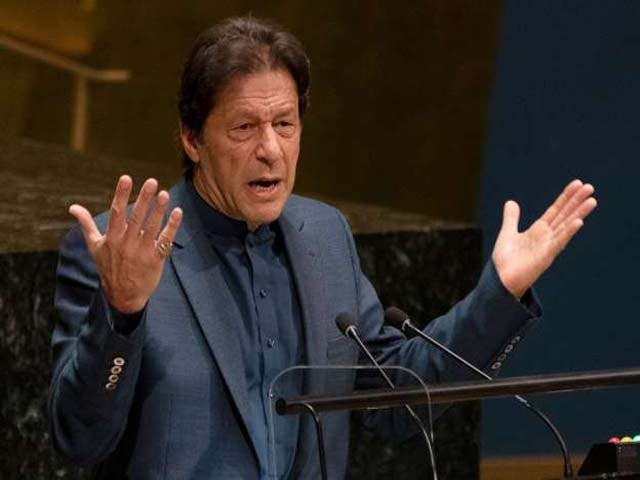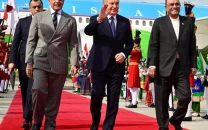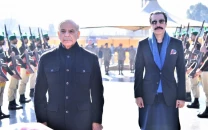PM Imran’s foreign policy makeover
As Afghanistan moves closer to peace, experts credit noticeable change in foreign policy under the premier

Measuring a country’s foreign policy successes is nigh impossible for the lay individual. The diplomatic process is usually obscure, couched in ambiguous language and often times, proceeding behind closed doors.
Even so, there are times a general shift in trend becomes apparent. And while actual success may still be imperceptible, one can sense positive developments are afoot.
For Pakistan, much of our foreign policy is focused towards the two neighbours the country shares its largest borders with – India and Afghanistan. Of late, there seems to have been noticeable forward movement towards both, in one way or another, under the stewardship of Prime Minister Imran Khan and his team.
Afghanistan, for instance, now appears closer than ever to finding lasting peace. Where once the US habitually blamed Pakistan for not ‘doing enough’, it has now repeatedly come out to laud Islamabad for facilitating this process.
In India, Premier Imran has had to deal with the most belligerent Indian leadership any government in Pakistan has faced. Narendra Modi’s Balakot misadventure last year came mere months after Premier Imran swore oath. As Pakistan’s military responded to the challenge in befitting fashion, the prime minister and his team de-escalated the crisis in statesmanlike manner. From that point on, Premier Imran and his government have made much progress in revealing India’s increasingly fascist bent under Modi.
Speaking to The Express Tribune, former foreign secretary Shamshad Ahmad Khan noted that there has been noticeable difference in the country’s foreign policy direction since PM Imran came to power. “His foreign policy, particularly with regards to India, has been very different from his predecessors,” the ex-diplomat said. “He has been able to do what none of our ambassadors could do.”
“Unlike his predecessor, who always appeared apologetic, Imran has appeared firm in his foreign policy convictions,” Shamshad said. “His charisma and personal approach to politics seem to be resonating with global leaders. Take for instance his call for increasing support for the poor. Within days, we various international organisations act in this regard.”
With regards to India, Shamshad said Premier Imran, despite Modi’s hegemonic mindset, has remained a steadfast advocate for peace. “He’s given a clear message that any competition should focus on economic development and poverty alleviation, instead of conflict.”
“At the same time, Imran has highlighted the apocalyptic threat that exists in South Asia because of Modi’s increasingly fascist policies,” he added.
For defence expert Maj-Gen (retd) Inamul Haque, the biggest foreign policy success with regards to India could be summed up in one phrase.
“The mask is off,” he said. “Thanks to the efforts of our present government, along with the role our media and diaspora has played, the truth about India and Modi is now prevailing in the world.”
Gen Inam noted that despite India’s influential diaspora, Modi’s Hindutva policies are now frequently a target of criticism globally, particularly in prestigious western publications. “Where once it was held up as a model of ‘secular pluralism, the world now notices that Indian democracy has become a Hindu oligarchy,” he said. “Our narrative on India is finally being accepted as true and has even seeped into India’s own psyche given how much domestic criticism Modi has faced.”
He added that since the events of February last year, Pakistan has repeatedly put India on the back foot, both diplomatically and militarily. “The Indian military had been baying for a fight but we were able to deter them in a measured way.
Prime Minister Imran Khan’s decision to hand back captured pilot Abhinandan Varthaman meant that India would have been seen responsible for further escalation. The world, as such, put the onus for peace on India.”
Gen Inam called the decision to open the Kartarpur Corridor another masterstroke on the part of Prime Minister Imran and his government. “It has helped Pakistan win over a sizable Indian community. All impediments now are from the Indian side and this is something that the Sikh community notices,” he said.
Lastly, he pointed out that Pakistan has always kept the option for dialogue open. “This has made it clear that Delhi’s arrogance is the biggest impediment for peace.”
Speaking about Afghanistan, Gen Inam admitted that Pakistan’s role is something that a lot of people, both at home and in other countries, don’t quite understand. “The role, by its nature, makes it so that our efforts aren’t very visible,” he said.
“But Pakistan’s importance with regards to Afghanistan is something that everyone involved in key decisions in the war-torn country understands,” he added. “There is a reason every Nato commander and every US senator vocally acknowledges us a key ally and stakeholder in Afghan peace.”
According to Gen Inam, Pakistan, one of the biggest achievements that can be attributed to Pakistan in the ongoing peace process is convincing the Afghan government to let Abdullah Abdullah spearhead talks with the Taliban and to release Taliban prisoners.
“Hundreds have been released so far, and while the Afghan government holds onto certain key figures, Pakistan has been vital in convincing it that what they think is leverage is actually counterproductive,” he said. “On the other hand, Pakistan has played a key role in reminding the Taliban that they can no longer hold on to power exclusively, and that they must be part of an inclusive arrangement,” he added.
“Pakistan, it must be understood, is strategically invested in Afghanistan,” Gen Inam stressed. “What we simply want is peaceful borders on both sides. A peaceful Afghanistan, which gradually moves towards economic sustainability, is in our interest.”
“That said, we would not like outside interference given that we share our second largest border with Afghanistan and we need to be mindful of powerful anti-Pakistan lobbies,” Gen Inam added. “Interestingly, it was never the Taliban who were responsible for the biggest snags in the Afghan peace process. Largely, that falls on the Afghan government, whether because of local or American detractors, or Indian influence,” he pointed out.
Former foreign secretary Shamshad concurred. “No country has deeper stake in Afghanistan than Pakistan. Since the Cold War, it is not Afghans alone that have suffered from what transpired in their country. Pakistan too has been a victim,” he said. “War in Afghanistan, and the militancy and instability it birthed, has damaged both our economy and national psyche.”
Regarding Premier Imran’s contribution to the Afghan peace process, Shamshad noted that he had always been a proponent for speaking to the Taliban. “There’s been no change in this regard. Imran has been very consistent that talks are the only way to restore peace,” he said. The former top diplomat added that the premier had also repeatedly called on the Afghan people to opt for peace and to not allow themselves to be manipulated.



















COMMENTS
Comments are moderated and generally will be posted if they are on-topic and not abusive.
For more information, please see our Comments FAQ